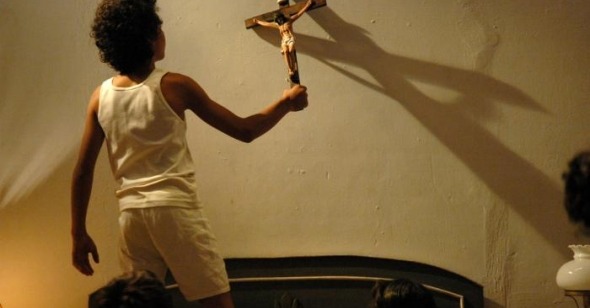Variety Blights
Jeff Reichert on Revolución
After the success of films like Paris je t’aime, New York I Love You, and Tokyo!, it was only a matter of time before the geographically minded omnibus migrated southward and nested in one of the burgeoning Central or South American filmmaking industries. Given the explosion of Mexico’s filmmaking industry and output over the last decade, the land of the shaking earth would seem a natural spot. Thankfully three of the country’s most famous exports, Guillermo del Toro (Pan’s Labyrinth—boo, hiss), Guillermo Arriaga (The Burning Plain—hahaha) and Alejandro González Iñárritu (Babel—grrr), are not involved in Revolución, which is comprised of ten shorts inspired by the Mexican Revolution of the early 1900s. Yet one almost wishes they were—at least then there’d be something risible about it.
As expected, the two best segments are from the filmmakers whose careers are most worth following: Fernando Eimbcke and Carlos Reygadas. Eimbcke’s The Welcome Ceremony, like his first feature, Duck Season, is shot in crisp, high-contrast black-and-white and tells the very small tale of a rural Mexican tuba player balancing his need to rehearse for the next day’s big performance with the problems of caring for a young child. Shots of the man at night, faintly silhouetted by distant light as he trudges what seems miles to find a store with milk for his child are lovely, and in wry, Eimbcke fashion, give way to a sun-baked morning tableau of the man fallen asleep, literally in his tuba. Ceremony may not do much beyond remind the viewer of Eimbcke’s impressive control over a certain rhythmic sensibility and mood, but when his mode of working is supremely pleasurable, who cares? It’s a great lead off for a collection of this sort.
Reygadas’s This Is My Kingdom showcases the same outré interest in bodies, carnality, and rural living that made his first feature, Japón, more than just a Mexican exercise in temps mort. He seems almost to be taking a page from the Harmony Korine irritation playbook here, as a small eight-hour village celebration (which mixes known filmmakers like Pedro González Rubio and Amat Escalante, who contributed a piece to Revolución, with random locals and workers) devolves into an orgy of violence, urination, drunkenness, and arson, all captured with none of the formal loveliness of his last, and best, film, Silent Light. Cruddy digital video is the order of the day, but as his camera circles the increasingly soused revelers, and Reygadas occasionally plies them with questions, one can’t help but realize an ungainly attractiveness about the filmmaking, even as the actions it captures turn ugly. Unlike with Korine, there’s no posturing here, and Reygadas’s aesthetic command reveals itself, even if obliquely. Kingdom is most reminiscent of Leos Carax’s similarly cracked entry in Tokyo! , the best standalone piece from the recent omnibus wave. Reygadas’s gonzo Marxist class-consciousness never seemed much like Carax’s fervid hothouse romanticism, but there might be something that binds these mad geniuses after all, especially when they loosen up and mess around with digital video.
The rest of the shorts pass more or less unnoticed. Patricia Riggen’s Beautiful & Beloved cribs its central joke from Weekend at Bernie’s before trying to wring out some tears for the finale. Mariana Chenillo’s The Estate Store makes a milquetoast critique of the economic conditions of Mexican wage-workers. Gerardo Naranjo’s awful R-100 follows two bloody protagonists as they try and make an escape from who-knows-what; it’s visceral but idiotic. Y tu mama también’s actors Diego Luna and Gael García Bernal acquit themselves, though I can’t say I remember much about either of their entries. Amat Escalante, who I’m not familiar with, turns out a nice slice of black-and-white Jodorowsky-lite called The Hanging Priest—he’s someone I might want to see more from.
Rodrigo García, who showed some formalist chops with the intricate single-take scenes of Nine Lives, tries out some slo-mo to close things out, with mixed results. His Los Angeles–set 7th and Alvarado finds specters of the revolution walking through drastically speed-impeded footage amidst present-day passersby on the corner of the title. No one notices the anachronism of pistoleros on burros mingling with office workers and skateboarders (perhaps it’s because everything mooooves soooo sloooowwwlllyyy), nor do they notice the swelling piano score meant to evoke ghosts, tragedies, history, memories, etc. In some ways, this kind of radical knock-off is what you want from an omnibus, as opposed to wimpy self-contained student theses, but the effect is unsustainable at ten minutes.
A parting shot: Taking a film to task for its typographical choices may seem petty, but when they affect the basic construction of an omnibus, the results can be a hindrance to comprehension. Instead of insisting its filmmakers adhere to some uniform method of titling and crediting their films, Revolución’s producers have allowed them to run amok. Some films have full titles and credits at head and tail, some save them for the end, some don’t employ them at all. While watching, one may wonder whether a given episode has ended, or if another story line in the same one has begun. How easy it would have been to insert chapter headings clearly delineating the shorts, and ask that all filmmakers save their tech credits until after the shorts have finished. Like most omnibus films, less effort seems to have been spent curating the final pieces and assembling the product into a movie than on envisioning and assembling a whiz-bang group of creators. Revolución is typical—it hits and whiffs.
